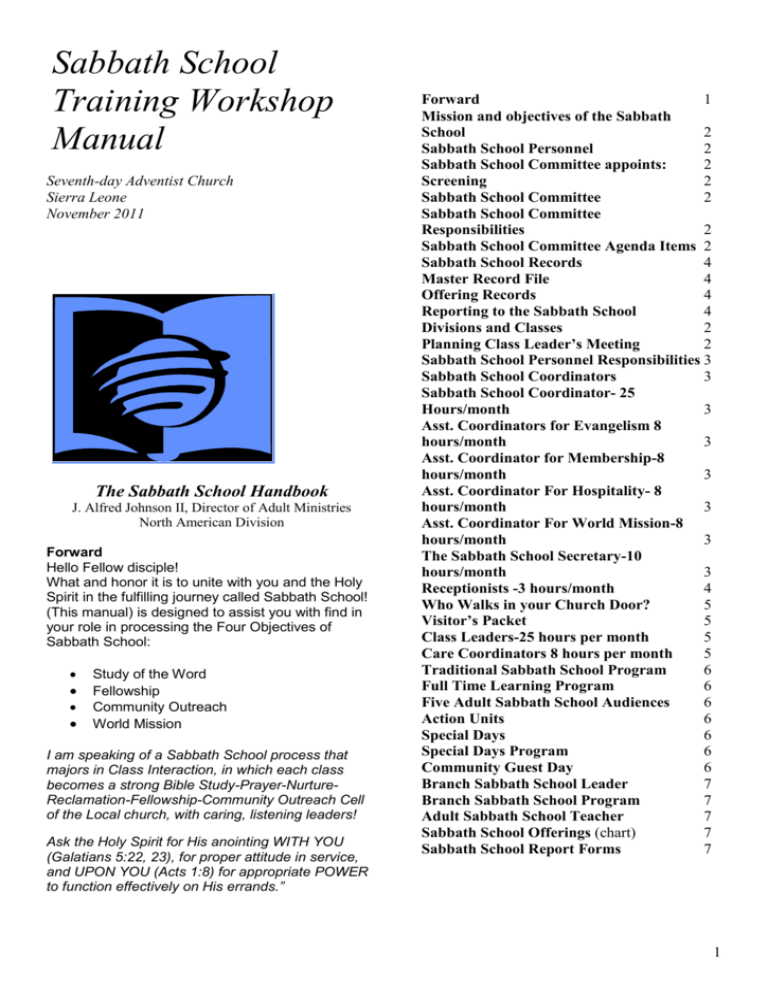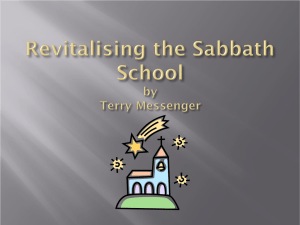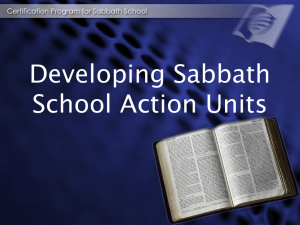Sabbath School Records - Seventh-day Adventist Church, Sierra
advertisement

Sabbath School Training Workshop Manual Seventh-day Adventist Church Sierra Leone November 2011 The Sabbath School Handbook J. Alfred Johnson II, Director of Adult Ministries North American Division Forward Hello Fellow disciple! What and honor it is to unite with you and the Holy Spirit in the fulfilling journey called Sabbath School! (This manual) is designed to assist you with find in your role in processing the Four Objectives of Sabbath School: Study of the Word Fellowship Community Outreach World Mission I am speaking of a Sabbath School process that majors in Class Interaction, in which each class becomes a strong Bible Study-Prayer-NurtureReclamation-Fellowship-Community Outreach Cell of the Local church, with caring, listening leaders! Ask the Holy Spirit for His anointing WITH YOU (Galatians 5:22, 23), for proper attitude in service, and UPON YOU (Acts 1:8) for appropriate POWER to function effectively on His errands.” Forward 1 Mission and objectives of the Sabbath School 2 Sabbath School Personnel 2 Sabbath School Committee appoints: 2 Screening 2 Sabbath School Committee 2 Sabbath School Committee Responsibilities 2 Sabbath School Committee Agenda Items 2 Sabbath School Records 4 Master Record File 4 Offering Records 4 Reporting to the Sabbath School 4 Divisions and Classes 2 Planning Class Leader’s Meeting 2 Sabbath School Personnel Responsibilities 3 Sabbath School Coordinators 3 Sabbath School Coordinator- 25 Hours/month 3 Asst. Coordinators for Evangelism 8 hours/month 3 Asst. Coordinator for Membership-8 hours/month 3 Asst. Coordinator For Hospitality- 8 hours/month 3 Asst. Coordinator For World Mission-8 hours/month 3 The Sabbath School Secretary-10 hours/month 3 Receptionists -3 hours/month 4 Who Walks in your Church Door? 5 Visitor’s Packet 5 Class Leaders-25 hours per month 5 Care Coordinators 8 hours per month 5 Traditional Sabbath School Program 6 Full Time Learning Program 6 Five Adult Sabbath School Audiences 6 Action Units 6 Special Days 6 Special Days Program 6 Community Guest Day 6 Branch Sabbath School Leader 7 Branch Sabbath School Program 7 Adult Sabbath School Teacher 7 Sabbath School Offerings (chart) 7 Sabbath School Report Forms 7 1 Mission and objectives of the Sabbath School The primary mission of Sabbath School is to teach members how to work for the Lord, reach people successfully and share God’s grace truth. p.1 Objectives: Study Sabbath School Mission Offering Fellowship Sabbath School Expense Community Outreach Thirteenth Sabbath Offering World Mission Emphasis Birthday and Thank Offerings Sabbath School Offerings p.10 Investment Fund Sabbath School Personnel Must be members in regular standing Elected by church, or appt. by Church Board or Selected by Sabbath School committee Sabbath School Officers include: General Coordinator (Sabbath School Superintendent) Asst Coor. (As needed) Children’s Ministry Coordinator Sabbath School Secretary Asst. Secretaries Division Leaders Investment Secretary Sabbath School Committee appoints: Adult Class leaders Division Secretaries Music Directors Pianists/Organists Greeters Ushers Sabbath School Committee Members include: Sabbath School Committee Agenda Items General Coordinator (chairperson) Asst. adult coordinators Children’s Ministries coordinator Sabbath School Secretary Asst. Secretary Division Leaders Investment secretary Personal Ministries Director An Elder Appt by the Church Board or Board of Elders The Church Pastor Sabbath School Committee Responsibilities Facilitates the smooth running of the Sabbath School. Anything that concerns the entire Sabbath School may be considered in this committee. Meets to plan for the coming year and schedule regular meetings throughout the term. Divisions and Classes Children Beginner (0-2) Kindergarten (3-5) Primary (6-9) Junior (10-12) Earliteens (13-14) Youth (15-18) Young Adult (19-35) Adult (35+) Divisions and Classes Extension Division Screening No adult should be considered for a leadership role in a church sponsored ministry or activity until he/she has been a member of the congregation or known by the organization for a minimum of six (6) months. Appt. of officers not elected by the Church Appt. of adult class leaders Adjustment in class membership Development or scheduling of training programs Materials, equipment, and facilities for the various divisions Scheduling Community Guest Days, Promotion Days, and other Special Occasions Setting goals for offerings, membership, and attendance Expediting allotment of Sabbath School expense funds Evaluation of overall Program Development of new adult Sabbath School classes Planning for community Outreach Other Sabbath School items that division leaders or the children’s coordinator may bring Planning Class Leader’s Meeting Every Sabbath School should have a class leaders’ meeting. The best results are obtained when the meeting is held prior to the Sabbath, so the leaders have time to assimilate the material and place it in their lesson plans. Agenda 1. Study the next week’s lesson 2. Continuing education on teaching technology, the study of a book or a course on teaching methodology. 3. Discussion of any general problems that may need consideration 2 Sabbath School Personnel Responsibilities Sabbath School Coordinators 1. No. 1 –General Coordinator, special days, rally day, etc. -1st Sabbath 2. No. 2 – World Mission – 2nd Sabbath 3. No. 3 – Music and Special Features -3rd Sabbath Each church will plan appropriate system for their needs. Sabbath School Coordinator- 25 Hours/month To encourage implementation of Sabbath School goals and objectives To administer the adult Sabbath School by developing leadership, chairing the Sabbath School Committee, building an evangelistic Sabbath School, and recruiting volunteers Supervise all class leaders Arrange training support and resources for Adult Sabbath School Check with the Sabbath School secretary on the adequacy of records and the accuracy and promptness of quarterly reports on the (mission) Foster the development of an adequate collection of Sabbath School books, cassettes, and videos in the church library. Be on hand early Sabbath morning to coordinate activities and answer questions. Work closely with the pastor particularly in the planning of training events, community outreach, and special programs. Call monthly meetings of the Sabbath School Committee. Call quarterly planning sessions where future plans and calendars for the division can be coordinated. Call a yearly planning session soon after the election of officers and before the new year begins Prepare the agenda of all meetings of the Sabbath School Committee Represent adult Sabbath School interests on the church Board Implement the four Sabbath School objectives Plan with the Asst. Coordinator for evangelism in promoting Branch Sabbath Schools, Community Guest days, Friendship Evangelism initiatives and class outreach opportunities. Plan with the reclaiming of inactive members Plan for mission education program Plan for care of visitor Plan for Sabbath School Growth Encourage activities outside of Sabbath School time such as potlucks, picnics, nature walks, and other social activities. Make sure the extension division is functioning properly ID potential Sabbath School personnel Be on hand early Sabbath morning Plan training events Arrange for frequent appreciation and affirmation to given to Sabbath School volunteers Asst. Coordinators for Evangelism 8 hours/month Direct Sabbath School outreach in the community Plan Community guest Day Sponsor Friendship Evangelism Follow-up Vacation Bible School Plan for Branch Sabbath School Dev. Follow-up of Visitors Asst. Coordinator for Membership-8 hours/month Analyze the local membership situation by the checking the Sabbath School member with Church membership Maintain Up-to-date list of contact info Assign visitation of inactive members. Help integrate newly baptized members Plan for Branch Sabbath School Dev. Follow-up of Visitors Asst. Coordinator For Hospitality- 8 hours/month Recruit, train, and supervise greeters Arrive early and supervise greeting process Assign visitation of inactive members. Devise a plan for welcoming visitors and recording their names, addresses and phone numbers Asst. Coordinator For World Mission-8 hours/month Make mission emphasis interesting Promote Mission giving Coordinate 13th Sabbath Program The Sabbath School Secretary-10 hours/month The Sabbath School Secretary cares for the records, supplies, offerings, and clerical details of the Sabbath School and all its division. 3 Class secretaries are responsible to the general Sabbath School secretary for information on membership, attendance and daily lesson study, and offerings Distribute and collect the class report cards, offering envelops, and personal ministries reports Check cards, count and record offerings Enter all weekly statistics in the Sabbath school Record and Registry Keep receipt from church treasures of all offerings Transfer names of all class members to the new Sabbath school class records each quarter. Maintain a Sabbath School membership file including baptized, unbaptized, inactive and prospective members. Maintain the weekly, monthly, quarterly, and yearly records required. Keep minutes of Sabbath School Committee meetings Preserve all records and pass them on to a successor Order and distribute all supplies and publications for the Sabbath school. Send out notices of meetings and take minutes of the meetings. Count the money, and record the amount and turn the funds over to the church treasurer Ask the treasurer for regular monthly financial statements. Sabbath School Records The Sabbath School secretary is responsible for keeping accurate records of Sabbath School activities and reporting to the Sabbath School Committee and the local conference (Mission) Master Record File Offering Records The Sabbath School should keep a master record file. The class record keeping system will include a Items recorded in the registry relate to membership, record of the class mission offering goal, and the attendance, offerings, officers, daily lesson study, weekly amount received in the class. A weekly teacher meetings, Sabbath School Committees, record of all Sabbath School offerings should be baptisms, Branch Sabbath Schools and Community kept by the Sabbath School secretary and Guest Days. reported to the class. As soon as possible after the offering is counted It also contains monthly, quarterly, and yearly and recorded, the secretary should turn the summaries of Sabbath School activities. The weekly money over to the church treasurer and receive a records are useful in preparing monthly statistical receipt. These receipts should be filed as a summaries of Sabbath School activities for the permanent record of the Sabbath School Sabbath School Committee, and yearly reports for the church business meeting. Sabbath School Class Records Reporting to the Sabbath School Each adult Sabbath School class should have a class The Sabbath School members should receive record listing the names of the members. All officers (periodic) updates on how the Sabbath school is and class leaders should be listed. As well as member doing. of the baptismal classes, specialized ministries, and Some of the statistics that may be shown are: the extension division. membership, attendance goal, actual attendance, offering goal, actual offering, daily study goal, Anyone who wishes may be a member of the Sabbath actual number following daily study plan, School class, and should be recorded in the class Investment goal, and Investment returns to date. record. The Sabbath School teacher is authorized to The information could be displayed on a chalk add the names of people who indicate their desire to board, white board, overhead projector, or in the join. church bulletin and/or newsletter. Many Sabbath Schools have register board in the front of the sanctuary, used to inform Sabbath School members about the progress of the Sabbath School. Receptionists -3 hours/month To make the atmosphere of the church warm and inviting. Make others feel comfortable, welcomed, and loved. Make friends of strangers. Become acquainted with the regular members so they can recognized visitors when they arrive Introduce themselves first, extend a welcome, and then ask for the visitor’s names. Introduce the person to someone who will show them a seat or help them find Sabbath School classes 4 Introduce newcomers to one or two other people in the church with whom they might feel comfortable because of shared interests. Show parents how to meet children’s needs Show visitors where to put wet umbrellas and how to find the restrooms. What to do with cell phones What people look for: Warm, friendly place Human contact Courteous treatment and to be recognized Verbal and body language that says “you are welcome and accepted” An attitude that says “We want you here” Who Walks in your Church Door? Strategies Visitor’s Packet Unchurched people Take-Don’t send “What’s an Adventist” Brochure Irregular attending Show- Don’t “hand History of the Church (SL) Adventists out” Weekly activities Guests of Members Connect with others Contact Number for church Don’t just seat them Visiting Adventist personnel Why do Missing Members Miss? Conflict- unresolved conflict with pastor, members, theological issues, church standards and policies Unmet Expectations-not helped during time of stress in their lives or burn out from church work not appreciated, not able to make friends. Law of affinity-lack of contacts of similar age group and interest Inability to relate-lack of ability to build meaningful relationships. Class Leaders-25 hours per month The role of the class leader is primarily to assist people in learning that will lead to faith development. The class leader is also expected to promote fellowship, community outreach, and world missions. Should devote 3-4 hours in lesson preparation, 2-4 hours for teachers meeting and attend committee meetings Teach the lesson and/or serve as discussion leader Encourage daily lesson study Attend teacher’s meetings and training sessions Seek to involve students in discussion and active learning Be aware of the characteristics of adult learners and their life issues and strive to meet those needs. Dynamic Sabbath School Classes Develop Theme for programs Set attendance goals Advertise Build class identity Involved in outreach and soul winning Lessons study at least 40 minutes Care Coordinators 8 hours per month Encourage Class members to call, visit missing members Set class offering goals and take up mission offering. Class leaders are responsible for all aspects of class management, such as attendance records, welcoming visitors, distributing materials Encourage members to be active in all activities of the church. See that member receive their Bible Study guides Watch for visitors and invite them to attend the class Take attendance Promote World Missions 5 Traditional Sabbath School Program 9:15 Song Service 9:30 Opening Remarks, Welcome, Prayer 9:35 Keeping on Course (choose one) Progress Report Evangelism Investment Improvement Occasional Special Feature 9:40 Musical Selection 9:45 World Mission Report 9:55 Class Time Class Activities – 10 min Lesson Study – 30 min 10:35 Closing Remarks. Preview Next Week Full Time Learning Program 9:00 Family Fellowship-singing, group activity, greeting, share and talk together 9:25 Group Activity (children go to div.) 9:40 Mission Feature or Person Ministry Training 9:50 Training or Nurture Seminar 10:20 Lesson Study 10:50 Closing Five Adult Sabbath School Audiences Traditionalists Fellowship-oriented Those who wish to do in-depth Bible Study Social Action Groups Multiple interest Groups Action Units Each audience group should have a leadership team made up of a team leader, teacher, greeter and prayer leader. Each should have corresponding spiritual gifts. Must meet weekly. Goal to find people like themselves and invite them to Sabbath School. Couples, Young Mothers, Parents, Musical groups, Temne, Mendi, etc. Special Days Advertise Day Ask all members to invite friends, relatives, neighbors Send written invitations of former members Display poster in foyer Appoint welcoming committee Special bouquet of flowers on the platform. Select motivated and effective speakers for platform Select special music for the occasion Offer awards for anyone bringing a visitor Share meal with class members and visitors Make visitor feel welcome and record information about them for follow-up Thank members for bringing visitors Contact every visitor thanking them for coming and inviting them back Enroll new member in Sabbath School Keep records and a scrapbook 9:15 Song Service 9:25 Welcome, Prayer 9:30 Music/special Feature 9:35 World Mission Report 9:45 Action Unit Begin Outreach Time 25 minutes Lesson Study 35 minutes Benediction in Classes Class of six to eight Outreach leader/care coordinator One hour class time Time for Missing Class Members Outreach Time: training for outreach and prayer Special Days Program Stay on time Prayer should be offered of friends and guests. Extend Cordial Welcome to “Community Guest Day” Mission Preparation: TOLD NOT READ Lesson Study: Teachers prepared and visitors welcomed and introduced by name to the class and encouraged to participate Community Guest Day A Community Guest Day is listed in the church calendar for the fourth quarter of each year. The purpose is to introduce the surrounding community to the work of the Seventh-Day Adventist Church Programs are planned one quarter in advance. Church anniversary might be celebrated. Avoid subjects that might offend those invited Community Service Awards to Outstanding Volunteers in the Community given Fellowship Meal. Decorations and Choir Music provide. Members mixed seating with guests Give a Welcome packet to all visitors and a thank you note for coming Choose familiar Hymns or Choruses to sing. 6 Branch Sabbath School Leader Organize and conduct and evangelistic program using Sabbath School materials to be held any day of the week Vacation Bible School, The Sabbath School Quarterlies, Health Studies, the 28 Fundamental Doctrines, etc. Send out invitations to neighbors Follow Sabbath School program format Forms a basis for a new church Branch Sabbath School Program Song Welcome Opening Song Special Feature (music, quiz, health talk, etc.) Adult Sabbath School Teacher Three Aims Facilitate Bible Learning Motivate spiritual growth Enable class members to develop scripturallyoriented life-styles. Adult Sabbath School Teacher Qualities Recognition of God’s call to teach Personal Experience with Christ Knowledge of the Bible Knowledge of Human Nature Personal Qualifications Consecration Cheerfulness Patience and tact Pleasing Speech Love Feeling of Responsibility Members incl. church members, missing members, guest to Sabbath school, prison min. contacts, hospital visit contacts, evangelistic meeting contacts. Etc. Meet in private home, public buildings, vacant buildings, prisons, nursing homes, out of doors Bible study and discussion Mission Story (video, verbal presentation) Closing Song Prayer Branch Sabbath School Plan Sheet Adult Sabbath School Teacher Methods Skills Teach in a variety of ways leading to active discussion and analysis Ability to help adults unlearn erroneous concepts and learn correct ones Ask questions that promote study and participation Attention getting skills Bible knowledge doctrinally and experientially Adult Sabbath School Teacher Methods Start with Central Concept-Connect the Learner Share expert information-visually, auditorily, kinesthetically, olfactorially. Guide them to Apply to their personal lives. Explore ways of Sharing and deepening new knowledge. Sabbath School Offerings (chart) 13th Sabbath Birthday/Thank Investment Weekly Mission 40% CHRISTIAN EDUCATION 10 % WORLD DIVISION SPECIALS (evangelism, new churches, etc.) 5 % GENERAL CONFERENCE OPERATIONS 10 % INTER-DIVISION EMPLOYEES (Pastors, doctors, teachers, evangelists.) 35 % World Division Appropriations (General Operations of the World Church) EXPERIENCIN G 8. INTEGRATE 7. VALUE DOING 1. CONNECT 2. EXAMINE REFLECTING CENTRA L CONCEP 3. PERSONALIZE T 5. TEST/TRY 3. IMAGE 4. DEFINE CONCEPTUALIZING Sabbath School Report Forms Statistical Report Quarterly by Church clerk and mailed the 5th day following last Sabbath in the Quarter Sabbath School Attendance Report 2nd Sabbath each Quarter by each class leader Sabbath School Profile 2nd Sabbath of each quarter by Sabbath School Sec. 7 8 Sabbath School Teaching Skills by Level Age Level Teaching Skills 1. Ability to teach in a variety of ways, all leading to active learning and the involvement of the student sin discussion and analysis. 2. The ability to help adult participants unlearn erroneous concepts and learn correct ones. Adult/Young 3. Ability to formulate and ask question in a way that engenders class participation Adult and study. 4. Attention-getting skills that engender participation and interest. 5. Sufficient biblical knowledge to be able to teach what the Bible says both doctrinally and experientially. 1. Ability to engender active participation, creativity, and innovation. 2. Impart biblical knowledge through interactive experiences. 3. Present biblical knowledge in a positive way that indicates that the gospel is Youth always gain. 4. Engender participation that encourages positive responses from peers. 1. Ability to manage a group of juniors in a way that encourages learning, but does not stifle creativity and curiosity. 2. Ability to turn responses, no matter how unique they may be, into positive learning experiences. Junior/Earliteen 3. Biblical knowledge based on interactive learning and focused on real life experiences as related in the Scriptures. 4. Present Jesus in an appealing way and lead the class member to a commitment to Him as lord and Saviour. 1. Ability to impart cognitive information and biblical knowledge at he age level of vocabulary and understanding of primary children. 2. Permit an open environment that encourages questions and responses, based on interactive learning principles. Primary 3. Present Jesus in an appealing way and lead the class members to a commitment to hi as Lord and Saviour. 4. Knowledge of the teaching materials available and how to use them. 1. Patience. 2. Ability to love and understand small children and deal with them in a loving, kind way. 3. Knowledge of children’s learning abilities and how best to engage them in Kindergarten interactive learning experiences. 4. Ability to teach in a concrete rather than abstract manner. 5. Knowledge of the teaching materials available and how to use them. 1. Patience. 2. Ability to love and understand small children. 3. Awareness of developmental stages in a child’s life. Beginners 4. Awareness of how to gage the developmental stage of each child. 5. Ability to teacher in a concrete rather than abstract manner. 6. Knowledge of the teaching materials available and how to use them. Sabbath School Handbook, page 102 9








